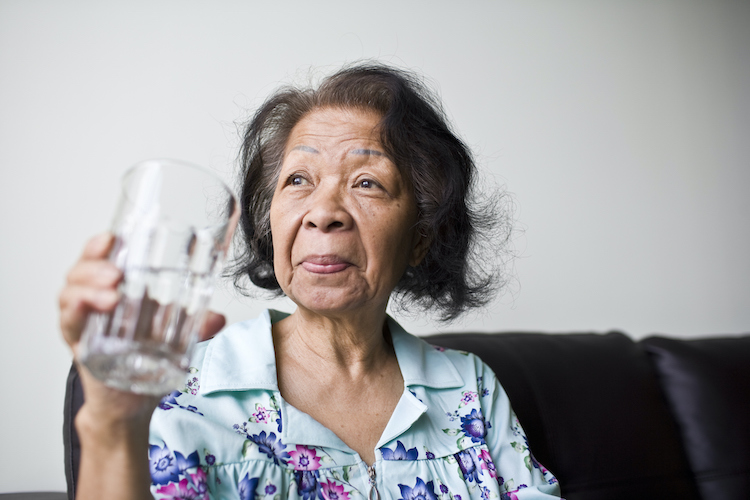
Learn about the dangers of dehydration in seniors and how to avoid serious medical conditions.
In the warmest time of the year, keeping up with proper hydration is essential, especially for older adults. As a matter of fact, close to 1/2 of all seniors are chronically under-hydrated, as documented in a recently available UCLA research study, which may bring on numerous health risks, including kidney stones, urinary tract infection, and even an elevated risk for falls.
The prevalence of dehydration in seniors is related to a variety of factors, which include:
- A decreased volume of water naturally taking place in older bodies
- Medication side effects
- Less awareness of the sensation of thirst
- A decreased capacity to maintain a proper fluid level balance in the body
- Diminished efficiency in the kidneys
- And more
There’s a basic calculation to determine just how much water a senior should drink each day. Take the individual’s body weight in pounds, and drink one-third that many ounces of water each day. Someone who weighs 120 pounds, for example, should drink at least 40 ounces of water daily – about five 8-ounce glasses.
Time is of the essence when it comes to the dangers of dehydration in seniors, as it’s easier to fix mild dehydration before it gets to be more severe. Symptoms include:
Minor Dehydration:
- Decreased, darker-colored urine
- Dry mouth
- Dizziness and fatigue
- Muscle cramping
- Irritability
- Headaches
Severe Dehydration:
- Disorientation and confusion
- Difficulty with walking
- Faint, fast pulse
- Low blood pressure
- Intensifying of muscle cramps
- Sunken, dry eyes
- Skin that is wrinkled and has reduced elasticity
- Bloating
- Quickened breathing
- Convulsions
Obtain medical attention as soon as possible should you suspect dehydration in an older adult, to circumvent serious health complications that can develop rapidly.
If the senior resists drinking adequate amounts of water, try flavoring the water or offering juice, if it is a suitable part of the older adult’s dietary plan. For those with conditions such as diabetes or obesity, the sugar content in juice may be dangerous. Occasionally, modifying the temperature of the beverage makes it more appealing as well, such as warming up a cup of water with a bit of lemon to sip on each morning, and then offering chilled water over crushed ice during the afternoon.
The key is always to have fluids readily available throughout during the day. Geriatric nurse Anne Vanderbilt, CNS, explains, “What I often see in our advanced older adults – people in their 80s and 90s – is that they can’t sit down and drink a full 8-ounce glass of water. It fills them up, causes bloating and then makes them have to run to the bathroom. So little sips throughout the day are better.”
To help ensure the seniors you love are staying hydrated and healthy, partner with Absolute Companion Care for knowledgeable elder care. Our caregivers are available to help supervise fluid intake, prepare wholesome meals, encourage older adults to continue to be physically active, and more for optimal health. Contact us at 410-357-9640 for a free in-home evaluation and for additional information about our top-rated home care and dementia care in Towson and the surrounding areas!
